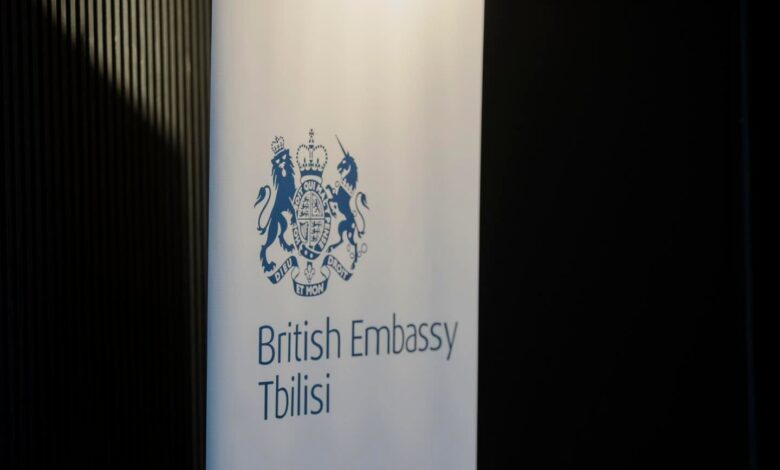
British Embassy Rejects GD’s Accusations of Funding ‘Propaganda and Extremism,’ Urges Invitation of ODIHR Observers
The British Embassy in Georgia has rejected accusations by the ruling Georgian Dream government that it is funding “propaganda and extremism” through support of local civil society organizations, including pre-election initiatives. The Embassy also urged the GD government to invite the ODIHR election observation mission for the upcoming local elections.
“The British Embassy exposed itself in funding extremism,” said Georgian Dream parliament speaker Shalva Papuashvili on June 11 on the pro-government channel Rustavi 2. Papuashvili claimed that the Embassy had been “planning to fund pre-election propaganda” through grants that were later canceled.
The Embassy’s June 18 statement came after other Georgian Dream members made similar accusations against the British Embassy, following Britain’s cancellation of several grants to Georgian civil society and media groups. The Embassy, in a June 12 announcement, said the canceled grants were intended to support “transparency and competitiveness” in Georgia’s upcoming local elections, scheduled for October 4. It said the decision was made due to procedural “uncertainty” stemming from Georgia’s new law on grants, which requires donors to obtain government approval before disbursing funds to local organizations.
Among the recipients of the now-canceled British government grants was the online media outlet Tabula, which confirmed the cancellation. Pro-government media also reported that other planned recipients included the Georgian Young Lawyers Association (GYLA), a human rights watchdog and election monitor, and Georgia’s Future Academy, a youth organization that also serves as an election observer. Papuashvili criticized Tabula as a “party propaganda newspaper” because it was founded by opposition leader Tamar Chergoleishvili, and accused the British Embassy of planning to fund it.
In response to the backlash from GD, the British Embassy said, “UK-Georgia co-operation is built on a joint commitment to strengthening democratic principles and to supporting the role of civil society in our bilateral co-operation,” referencing the Strategic Partnership and Cooperation Agreement signed by the two countries in 2019. The agreement, it noted, commits both sides to cooperate “on increasing the stability and effectiveness of democratic institutions and the rule of law; on ensuring respect for human rights and fundamental freedoms; on making further progress on judicial and legal reform,” and to ensure “the involvement of civil society in UK-Georgia relations and to facilitate an enabling environment for the development of civil society.”
“It is on this basis that for many years the UK has supported civil society in Georgia,” the Embassy said, referencing, among other things, election-related support. “The Georgian government itself previously supported this activity,” it added. “And we reject its current description of funding ‘propaganda and extremism.’”
“Nothing could be further from the truth.”
The Embassy also used the statement to call on the Georgian government to invite the OSCE/ODIHR international election observation mission for the upcoming municipal elections and to “take forward all recommendations in ODIHR’s final report on the 2024 parliamentary elections.”
“The hopes and aspirations of the Georgian people are for democracy and freedom, and we hope that UK-Georgia co-operation, as well as Georgia’s co-operation with European institutions, will further contribute to those goals,” the Embassy concluded.
Speaking to reporters following the Embassy’s statement, GD Prime Minister Irakli Kobakhidze claimed the grants were intended for organizations “directly affiliated with the radical opposition,” naming Tabula and Georgia’s Future Academy.
Asked whether the GD government would invite ODIHR observers for the upcoming local elections, Kobakhidze said, “Generally, it’s not a practice that countries invite ODIHR for local elections.” While acknowledging there have been “exceptions” when ODIHR monitors local polls, he added that such monitoring would now be “unnecessary” in Georgia.
However, OSCE/ODIHR observed the 2021 and 2017 local elections in Georgia with large monitoring missions. Georgian authorities also sent an invitation to OSCE/ODIHR to observe the 2014 municipal elections, but ODIHR said at the time observation was unlikely, citing its financial issues.
Also Read:
- 12/06/2025 – ODIHR: We Have Not Received Invitation to Observe Local Elections in Georgia
- 10/06/2025 – GD Parliament Further Amends Law on Grants
- 31/05/2025 – Georgian Dream’s FARA Takes Effect
This post is also available in: ქართული